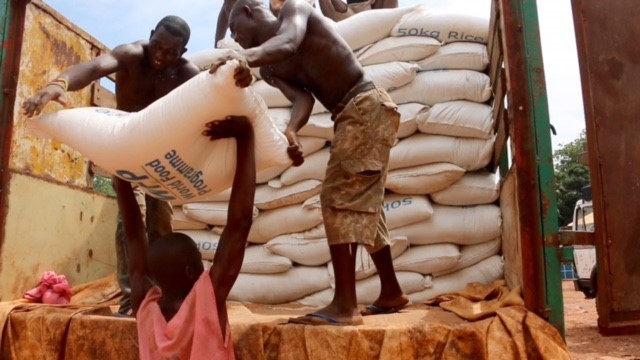Speeches Shim

August 2017—Households in the Central African Republic (CAR) would normally be tending and harvesting their crops from July to September, during the peak rainy season. This year, however, surging conflict has forced thousands of farmers to abandon their fields. As a result, weeds are overtaking land that once provided income and food for Central African families.
Odile Gboladji*, only 18 years old, is a member of one of these families. After militias chased Odile and her family from their home near Alindao—a town in southern CAR’s Basse-Kotto prefecture—they hid in the bush for days until they thought it was safe to return home. When they reached their house, however, they found their relatives dead and their possessions looted. Now, the family lives in a temporary wooden and tarp shack at a church in Alindao.
The Gboladji family is not alone. As of June 2017, the United Nations estimates that more than 1 million Central Africans—almost a quarter of the population—are displaced within CAR or as refugees in neighboring countries, cut off from their livelihoods and support systems. Crisis levels of acute food insecurity grip these vulnerable populations, and they require urgent humanitarian assistance to meet their basic needs.
“We had nothing left to eat until now,” says Odile.
Upon arriving in Alindao, her family received rations of dried beans and fortified flour. USAID’s Office of Food for Peace has partnered with the U.N. World Food Program (WFP) to provide life-saving aid to conflict-affected Central Africans such as Odile.
To date in fiscal year 2017, USAID has contributed approximately $40 million to WFP to provide emergency food assistance—including food from the United States and from local and regional markets—to Central African internally displaced persons and refugees. USAID also enables WFP to distribute cash transfers and food vouchers to food-insecure Central African refugees who live near functioning markets.
The violence in CAR shows no sign of stopping, and displaced households continue to rely on emergency assistance. USAID and its partners continue to support the Gboladjis and families like them while they wait to return to their homes in peace.
*Names changed to protect identities.
LINKS
Follow @usaidafrica

Comment
Make a general inquiry or suggest an improvement.